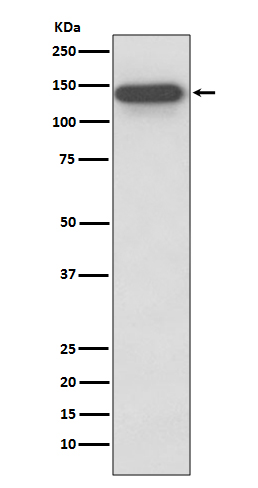
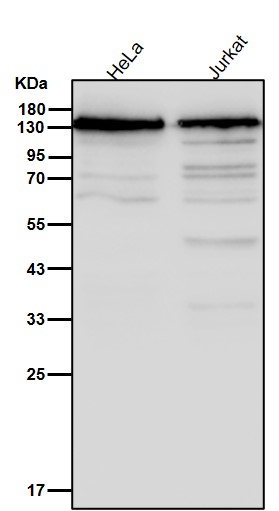
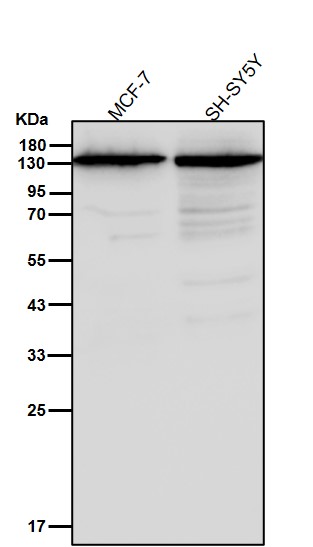
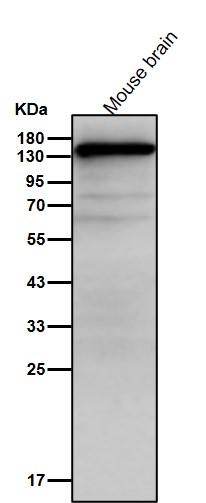
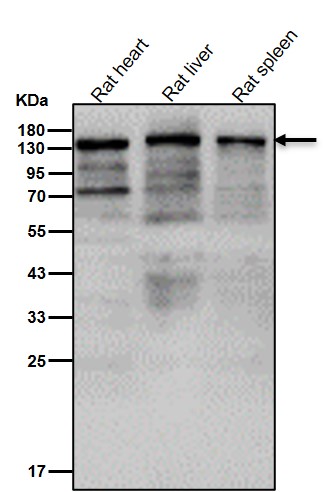
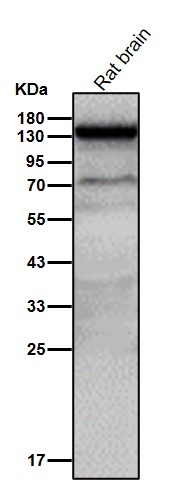
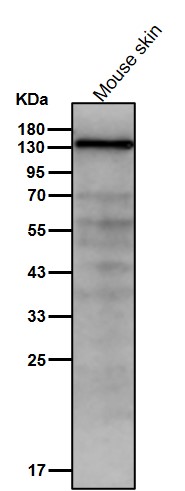
| WB | 咨询技术 | Human,Mouse,Rat |
| IF | 咨询技术 | Human,Mouse,Rat |
| IHC | IHC:1/100-1/200;IHF:1/50-1/200 | Human,Mouse,Rat |
| ICC | 1/50-1/200 | Human,Mouse,Rat |
| FCM | 1/20-1/100 | Human,Mouse,Rat |
| Elisa | 咨询技术 | Human,Mouse,Rat |
| Aliases | SMC protein 3; Bamacan; SMC3; BAM; BMH; CSPG6; SMC3L1;;SMC3 |
| WB Predicted band size | Calculated MW: 142 kDa ; Observed MW: 141 kDa |
| Host/Isotype | Rabbit IgG |
| Antibody Type | Primary antibody |
| Storage | Store at 4°C short term. Aliquot and store at -20°C long term. Avoid freeze/thaw cycles. |
| Species Reactivity | Human,Mouse,Rat |
| Immunogen | A synthesized peptide derived from human SMC3 |
| Formulation | Purified antibody in PBS with 0.05% sodium azide,0.05% BSA and 50% glycerol. |
+ +
以下是3篇关于SMC3抗体的参考文献及其摘要概括:
1. **《Cohesin subunit SMC3 regulates pluripotent self-renewal through transcriptional control of the Wnt/β-catenin pathway》**
- 作者:Zhang, J. et al.
- 摘要:研究利用SMC3抗体进行染色质免疫沉淀(ChIP)和免疫印迹分析,揭示SMC3通过调控Wnt信号通路维持多能干细胞的自我更新能力,并证明其缺失导致分化异常。
2. **《SMC3 deficiency restricts dorsal neural progenitor development in spinal cord》**
- 作者:Li, Y. et al.
- 摘要:通过SMC3抗体免疫组化和基因敲除模型,发现SMC3蛋白在小鼠脊髓背侧神经前体细胞发育中起关键作用,其缺失导致神经管闭合缺陷和细胞周期停滞。
3. **《SMC3 mutation causes cohesinopathy with severe cardiac arrhythmia and skeletal dysplasia》**
- 作者:Wang, S. et al.
- 摘要:研究利用患者来源的细胞系,结合SMC3抗体的免疫荧光分析,发现SMC3基因突变导致染色体分离异常,引发心脏传导障碍和骨骼发育异常,揭示了新的致病机制。
4. **《Antibody-based profiling of SMC3 post-translational modifications in cancer progression》**
- 作者:Chen, L. et al.
- 摘要:通过开发特异性识别磷酸化和乙酰化修饰的SMC3抗体,研究发现SMC3翻译后修饰在结直肠癌转移中异常调控,并与患者预后显著相关。
The SMC3 antibody targets the Structural Maintenance of Chromosomes 3 (SMC3) protein, a critical component of the cohesin complex. Cohesin, composed of SMC1. SMC3. RAD21. and STAG subunits, plays essential roles in chromosome organization, sister chromatid cohesion during mitosis and meiosis, DNA repair, and transcriptional regulation. SMC3. an ATPase, forms a V-shaped heterodimer with SMC1. creating a ring-like structure that entraps DNA strands to mediate cohesion and loop formation. Dysregulation of SMC3 is linked to genomic instability, developmental disorders (e.g., Cornelia de Lange syndrome), and cancers, where aberrant expression or mutations correlate with tumor progression and poor prognosis.
SMC3 antibodies are widely used in research to study cohesin's biological functions. They enable detection of SMC3 protein levels via Western blotting, immunofluorescence, or immunohistochemistry, and facilitate chromatin immunoprecipitation (ChIP) to map cohesin-binding sites. These tools have revealed SMC3's involvement in 3D genome architecture, gene expression modulation, and cell cycle regulation. In clinical contexts, SMC3 antibodies aid in exploring its role as a potential biomarker or therapeutic target in malignancies. However, interpretation requires caution due to post-translational modifications (e.g., acetylation, phosphorylation) that influence cohesin dynamics. Research using SMC3 antibodies continues to uncover mechanistic insights into chromosomal stability and disease pathogenesis.
×